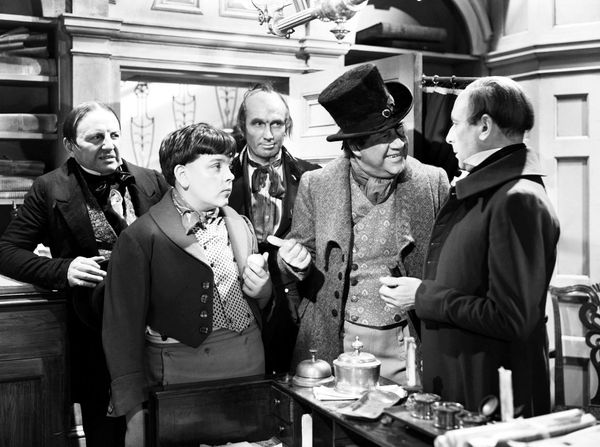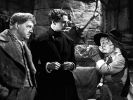Eye For Film >> Movies >> The Life And Adventures Of Nicholas Nickleby (1947) Film Review
The Life And Adventures Of Nicholas Nickleby
Reviewed by: Owen Van Spall

Alberto Cavalcanti's Ealing Studios adaptation of Charles Dickens's famous, originally serialised story, is memorable for being the first synchronised sound adaptation to be filmed. Now it has been remastered and rereleased on DVD by Studiocanal to celebrate the 200th birthday of the great writer, and though the transfer delivers in terms of solid picture and sound quality for a 1940s black and white, its hardly the most invigorating, amusing or emotionally powerful Dickens story to be put on film and its hard to see what Cavalcanti brings to the table that is unique. It's far from unwatchable, but it certainly won't be eclipsing Great Expectations or Oliver! any time soon.
The story is packed with plenty of Dickens' tropes - elderly miserly uncles, kindly drunks, street urchins, unscrupulous and brutish workhouse managers, and striving underdogs (in this case the titular character) ennobled by their kindness and education. When his family are left destitute by the death of the father, young Nicholas Nickleby and his mother and sister Kate, are forced to take refuge in the mansion of cold, calculating Uncle Ralph or face the workhouse. From his position of advantage, Ralph aims to manipulate the beautiful Kate to his own ends, using her as a business lure.

Nicholas, meanwhile, is packed off to work as an assistant at the Dotheboys workhouse, where his idealistic streak causes him to fight against the exploitative regime installed by the domineering Wackford Squeers. Thrown out of that job, and earning the enmity of Uncle Ralph, Nick ends up in race against time to find gainful employment so he can provide for his family before they fall under the spell of Uncle Ralph. An adventure across the country ensues, as Nick jumps from job to job and place to place.
If this rather workmanlike adaptation has any standout aspects, it is probably the performance of Cedric Hardwicke as Ralph, a looming presence as the sophisticated, monied villain with a complexity to him so he avoids 100 per cent moustache twirling status (manipulative he might be but he does provide for his relatives and protect them to an extent) while also being suitably menacing.
The camera work also comes more alive with some surreal expressive touches in the final denoument as Uncle Ralph gets his inevitable just desserts. But beyond that, there is little here in terms of acting, mise en scene or humorous moments to distinguish this adaptation, and in particular the acting performance of Mary Merrell as the dotty Mother Nickleby has not aged well, eventually becoming highly irritating. Perhaps the task of diluting down the whopping 900 pages of the original story was too much for scriptwriter John Dighton and Cavalcanti, as although the pace is nippy, few of the eccentric characters who cross in front of the camera make much of an impact, though that might just as well be blamed on some underpowered and flat acting.
Reviewed on: 06 Jun 2012


















